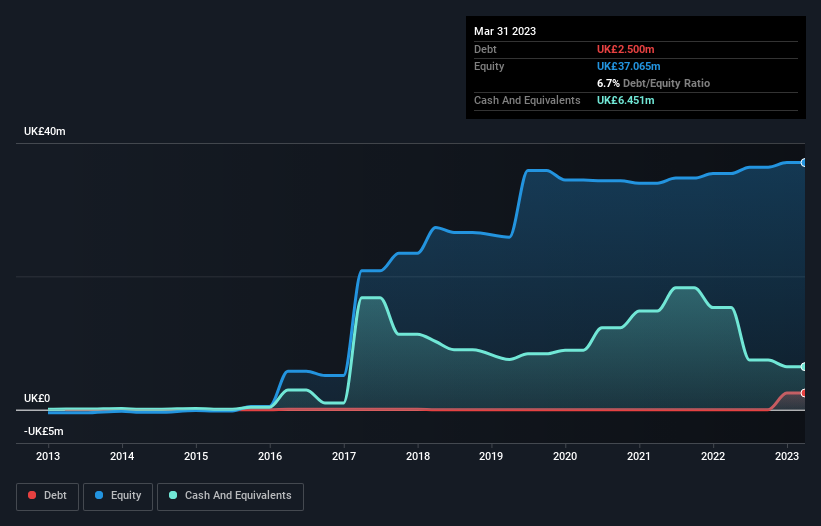
Warren Buffett famously said, 'Volatility is far from synonymous with risk.' So it might be obvious that you need to consider debt, when you think about how risky any given stock is, because too much debt can sink a company. We can see that Totally plc (LON:TLY) does use debt in its business. But should shareholders be worried about its use of debt?
When Is Debt A Problem?
Debt is a tool to help businesses grow, but if a business is incapable of paying off its lenders, then it exists at their mercy. If things get really bad, the lenders can take control of the business. While that is not too common, we often do see indebted companies permanently diluting shareholders because lenders force them to raise capital at a distressed price. Of course, plenty of companies use debt to fund growth, without any negative consequences. When we think about a company's use of debt, we first look at cash and debt together.
See our latest analysis for Totally
What Is Totally's Debt?
You can click the graphic below for the historical numbers, but it shows that as of March 2023 Totally had UK£2.50m of debt, an increase on none, over one year. However, it does have UK£6.45m in cash offsetting this, leading to net cash of UK£3.95m.

A Look At Totally's Liabilities
The latest balance sheet data shows that Totally had liabilities of UK£31.5m due within a year, and liabilities of UK£2.35m falling due after that. Offsetting these obligations, it had cash of UK£6.45m as well as receivables valued at UK£13.7m due within 12 months. So it has liabilities totalling UK£13.7m more than its cash and near-term receivables, combined.
While this might seem like a lot, it is not so bad since Totally has a market capitalization of UK£25.0m, and so it could probably strengthen its balance sheet by raising capital if it needed to. However, it is still worthwhile taking a close look at its ability to pay off debt. While it does have liabilities worth noting, Totally also has more cash than debt, so we're pretty confident it can manage its debt safely.
In addition to that, we're happy to report that Totally has boosted its EBIT by 60%, thus reducing the spectre of future debt repayments. There's no doubt that we learn most about debt from the balance sheet. But it is future earnings, more than anything, that will determine Totally's ability to maintain a healthy balance sheet going forward. So if you're focused on the future you can check out this free report showing analyst profit forecasts.
But our final consideration is also important, because a company cannot pay debt with paper profits; it needs cold hard cash. While Totally has net cash on its balance sheet, it's still worth taking a look at its ability to convert earnings before interest and tax (EBIT) to free cash flow, to help us understand how quickly it is building (or eroding) that cash balance. Over the last two years, Totally actually produced more free cash flow than EBIT. There's nothing better than incoming cash when it comes to staying in your lenders' good graces.
Summing Up
While Totally does have more liabilities than liquid assets, it also has net cash of UK£3.95m. The cherry on top was that in converted 132% of that EBIT to free cash flow, bringing in -UK£4.0m. So is Totally's debt a risk? It doesn't seem so to us. There's no doubt that we learn most about debt from the balance sheet. But ultimately, every company can contain risks that exist outside of the balance sheet. For example Totally has 5 warning signs (and 2 which are significant) we think you should know about.
If, after all that, you're more interested in a fast growing company with a rock-solid balance sheet, then check out our list of net cash growth stocks without delay.
Valuation is complex, but we're here to simplify it.
Discover if Totally might be undervalued or overvalued with our detailed analysis, featuring fair value estimates, potential risks, dividends, insider trades, and its financial condition.
Access Free AnalysisHave feedback on this article? Concerned about the content? Get in touch with us directly. Alternatively, email editorial-team (at) simplywallst.com.
This article by Simply Wall St is general in nature. We provide commentary based on historical data and analyst forecasts only using an unbiased methodology and our articles are not intended to be financial advice. It does not constitute a recommendation to buy or sell any stock, and does not take account of your objectives, or your financial situation. We aim to bring you long-term focused analysis driven by fundamental data. Note that our analysis may not factor in the latest price-sensitive company announcements or qualitative material. Simply Wall St has no position in any stocks mentioned.
About AIM:TLY
Undervalued with adequate balance sheet.

